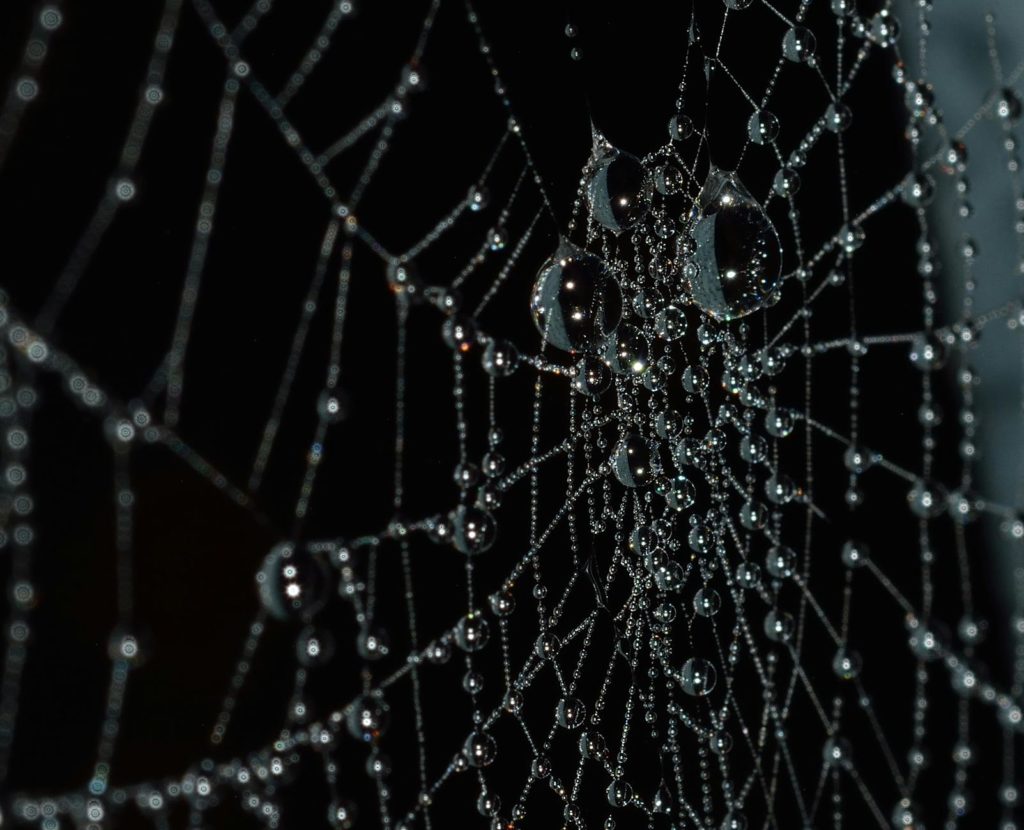No Doubt is that rare band which skillfully skates across the thin ice of mainstream success without falling through into the icy waters of sell-out accusations. They emerged from the Southern California ska scene in the late 1980s, injecting a vibrant, punk-tinged energy into the airwaves of the 90s. With Gwen Stefani at the helm, her distinct voice and charisma catapulted the band into one of the era’s most recognizable and influential acts. Their sound—a montage of ska, reggae, new wave, punk, and pop—was as eclectic as it was catchy. They became a staple on both radio playlists and teenage bedroom walls.
Venturing into the now cobweb-infested attic of No Doubt’s discography, you’ll quite ironically find the track “Spiderwebs” nestled comfortably among their most illustrious hits. Released as part of their 1995 album “Tragic Kingdom,” a title that hints at both fairy tale, whimsy, and underlying distress, “Spiderwebs” stands out as a quintessential example of No Doubt’s ability to blend infectious rhythms with deeper lyrical themes. The song, much like a spider deftly weaving its web, entangles listeners in a mesh of upbeat ska rhythms and Stefani’s dynamic vocal delivery. All the while it spins a tale of miscommunication and the desire to untangle oneself from the sticky threads of unwanted conversations.
Looking back, “Spiderwebs” is a snapshot of a band at the peak of its creative powers. This song doesn’t just get stuck in your head; it wraps around your thoughts, inviting introspection with a side of toe-tapping. So, as we dive into the intricacies of “Spiderwebs,” prepare to be caught in the intriguing web of its musicality, themes, and cultural significance. But don’t worry, this web won’t leave you hanging on the line.
Background of “Spiderwebs” by No Doubt
In the mid-90s, No Doubt dropped their LP “Tragic Kingdom,” a title playfully jabbing at the happiest place on earth while encapsulating the album’s themes of heartbreak, disillusionment, and the quest for personal identity. This album is part fairy tale, part emotional rollercoaster, and entirely a masterpiece.
Standing at the crossroads of fame and artistic integrity, No Doubt decided to take the road less traveled by, paving it with their eclectic musical influences. “Tragic Kingdom” was a narrative outlined much like a novel dealing with one person’s formative years or spiritual education. Each track holds a chapter of raw emotion and vibrant storytelling.
Now, while the entire album deserves its own wider appreciative look, let’s currently spin our focus to “Spiderwebs.” This track was born out of the tangled threads of Gwen Stefani’s personal life. Its lyrics were inspired by a real-life experience of Stefani being harassed by an obsessive admirer who would call her at all hours and recite bad poetry to her.
Instead of throwing the phone out the window, though, she does what any artistically inclined individual would do—she channels her frustration into songwriting. With Tony Kanal, the band’s bassist and Stefani’s former beau, contributing to the writing process, there’s certainly some layers of personal irony stitched into the song’s fabric.
The creation of “Spiderwebs” is much like a culinary experiment brought to pop music. Stefani and Kanal, along with the rest of the band, tossed in ingredients of ska, punk, and a dash of pop. They simmered it with personal experiences, seasoning it with metaphors of communication breakdown. The result is a song that resonates with anyone who’s ever wanted to screen their calls or, in a pre-cell phone era, yank the cord right out of the wall. It’s a quirky, upbeat anthem to the universally relatable desire of wanting to disconnect from the chaos of problematic, or even entirely unwanted, relationships.
In the grand scheme of “Tragic Kingdom,” “Spiderwebs” stands out as proof to No Doubt’s ability to transform personal turmoil into musical gold. This song connects with anyone who’s ever felt entangled in the messy web of human connections. It reminds us that, yes, it’s okay to sometimes let the answering machine pick up.
Musical Composition of “Spiderwebs”
Diving into the musical composition of “Spiderwebs,” each layer reveals a new facet of No Doubt’s genius. At its core, the song is a masterclass in the art of blending genres. It’s a sonic cocktail equaling parts ska, punk, and rock, shaken not stirred.
Let’s start with the structure. “Spiderwebs” doesn’t just play by the rules of songwriting; it dances around them, sometimes in a ska-infused skank. The song kicks off with a burst of energy, an auditory wake-up call courtesy of the horns and a guitar riff sharp as a spider’s fang. This leads into Stefani’s vocals, which play hopscotch over the verses and chorus, each word delivered with a punchy potency.
The blend of ska and rock is where “Spiderwebs” truly shines. It’s like listening to ska and rock as two old friends catching up over drinks; the song is their conversation, effortlessly flowing, occasionally interrupting each other, but always complementing the overall narrative. The ska elements bring a bouncy, upbeat rhythm, a musical embodiment of trying to dodge unwanted phone calls with an awkward dance. Meanwhile, the rock elements provide a gritty edge, like the frustration of repeatedly hearing the phone ring. This musical push-and-pull mirrors the song’s theme of communication breakdown.
The instrumentation in “Spiderwebs” wonderfully helps set the tone for the song’s lyrics and creates an energetic atmosphere. The horns are like the heralds of the song, announcing the arrival of something both fun and frenzied. The guitar riffs weave in and out, much like the metaphorical spiderwebs, creating a complex, but also catchy texture. Meanwhile, the bass and drums lay down a foundation that’s as solid as it is subtle, driving the song forward without overpowering it.
Overall, the musical composition of “Spiderwebs” is clear evidence to No Doubt’s ability to take diverse musical elements and bake them into a treat that’s as vibrant and enduring as the very themes this song explores. It’s a prime example of how the most chaotic sonic mixtures can produce the most harmonious results.
Exploring the Meaning of “Spiderwebs” Lyrics
”Spiderwebs” is a commentary on the sticky situations of human interaction. The song whimsically uses the metaphor of spiderwebs to depict the tangled, often frustrating nature of communication breakdowns. Just like literally walking into an unseen spiderweb, the song captures that jolt of surprise, annoyance, and entanglement we feel when we’re caught in conversations we’d rather avoid.
The song’s lyrics express Stefani’s frustration and annoyance with the unwanted attention, as she declares: “Sorry I’m not home right now / I’m walking into spiderwebs / So leave a message and I’ll call you back.” It musically embodies that universal desire to say, “Sorry, I’m not home right now,” and mean it, both literally and metaphorically.
The themes of “Spiderwebs” are both timeless and relatable. Communication breakdown is a cornerstone of the human experience, a shared frustration across cultures and generations. With her lyrical prowess, Stefani paints a picture of personal boundaries being breached, of being ensnared in unwanted dialogues, much like a fly in a spider’s web. The song taps into that intrinsic need for autonomy in our interactions, highlighting the importance of setting boundaries, even if it means letting the answering machine take the hit.
When we compare “Spiderwebs” to other popular songs with similar themes, it’s like holding up a mirror to a society perennially grappling with communication woes. Take, for example, The Police’s “Don’t Stand So Close to Me.” Much like “Spiderwebs,” that song deals with the complexities of unwanted attention and the need for personal space. Also, there’s Alanis Morissette’s “You Oughta Know,” which channels the raw emotion of a communication breakdown in a relationship. “Spiderwebs” especially offers us comfort in the knowledge that we’re not alone in our desire to sometimes just hang up the phone and instead bask in the glory of silence.
“Spiderwebs” is more than just a catchy tune. Set to the backdrop of ska-infused rock, it’s a reflection on how sometimes the best way to deal with unwanted interactions is to recognize when to step back and untangle ourselves. When it comes to popular songs from the 1990’s, “Spiderwebs” certainly grades very highly with its meaningful lyrics.
Gwen Stefani’s Vocal Delivery and Performance
Beyond co-writing lyrics dripping with nuance and meaning, Gwen Stefani delivers a vocal performance in “Spiderwebs” that’s daring, mesmerizing, confident, and seemingly effortless. Her voice on this track is more than just a vehicle for the lyrics; it’s an integral character in the story of the song. Stefani manages to infuse each word with a blend of sarcasm, frustration, and a touch of whimsy, perfectly mirroring the song’s tangled theme.
Stefani’s voice flits and dances around the notes, at times assertive, yet at other times almost playful. It mirrors the movements of someone skillfully dodging the unwanted advances of an overzealous caller. This dynamic range adds a rich layer to the song, enhancing its message about the desire for autonomy in our interactions.
Live performances of “Spiderwebs” add another dimension to its reception. On stage, Stefani transforms the song into an energetic, almost theatrical experience. She brings the song’s narrative to life with her charismatic presence. Stefani’s dynamic performance elevates the song from a mere track on an album to a memorable, interactive experience.
This connection through live performances of “Spiderwebs” has no doubt (pun intended) played a significant role in the song’s enduring popularity. While radio play alone cemented its place as a hit song, Stefani’s energetic performances have made it a cultural touchstone for anyone who’s ever felt tangled in the web of human connections.
Cultural Impact and Reception of “Spiderwebs”
“Spiderwebs” has left a lasting impact on popular music, media, and society. It was both a critical and commercial success, receiving positive reviews from critics who praised its catchy melody, energetic performance, and relatable theme. The song reached the top 20 on the US Billboard Hot 100 Airplay chart, and the top 40 in several other countries, including Canada, New Zealand, Sweden, and the UK.
The song also helped No Doubt gain recognition and popularity, as they were nominated for two Grammy Awards in 1997, for Best New Artist and Best Rock Album. “Spiderwebs: has since been included on several of No Doubt’s compilations, such as The Singles 1992–2003 and Icon. It’s also featured on various soundtracks, such as Clueless and 10 Things I Hate About You. Additionally, it appears on the track list for the smash hit video game Rock Band 2.
“Spiderwebs” also had a significant impact on popular culture and its representation in media. The song’s music video, directed by Marcus Nispel, features No Doubt performing the song at a wedding reception with Japanese guests. The video showcases Stefani’s unique style and charisma, as she designed her own wardrobe for the clip, drawing favorable comparisons to Madonna. It also reflects the song’s theme of communication and technology, as well as the band’s multicultural influences. This music video was nominated for two MTV Video Music Awards in 1996, for Best Group Video and Best Alternative Video, and has been viewed over 27 million times on YouTube.
Because it blended different musical genres and styles, “Spiderwebs” resonated with a wide range of listeners and its universal feeling of annoyance with unwanted callers. The song also inspired other artists to experiment with ska punk and reggae, such as Sublime, Reel Big Fish, and Rancid, as well as to incorporate humor and wit into their lyrics, such as Blink-182, Green Day, and Weezer. “Spiderwebs” also captured the zeitgeist of the mid-90s, when the internet and cell phones were becoming more prevalent and changing the way people interacted. Lyrics from the song even became common greetings on answering machines and voicemail.
The Relevance of “Spiderwebs” Today
While “Spiderwebs” was inspired by Stefani’s experience in the 1990s, the song’s themes are still relevant today. In the social media age, people often find themselves in a similar position to Stefani more than ever, where access to their personal space is taken advantage of by often anonymous messengers.
“Spiderwebs” unintentionally also addresses the challenges of communication and relationships in the digital age, where messages can be easily misinterpreted, ignored, or deleted. The song’s chorus, “Leave a message and I’ll call you back,” can be seen as a way of asserting one’s boundaries and autonomy, as well as a polite way of rejecting unwanted advances. The song also still empowers listeners to stand up for themselves and not let others interfere with their lives.
Not only is “Spiderwebs” a song that has cemented its place in No Doubt’s career and music history—it transcended its musical genre and become a cultural icon. It remains one of the best showcases of the band’s talent, creativity, and diversity, as well as Stefani’s personality, style, and voice. While it certainly isn’t nearly as popular today as in its heyday, “Spiderwebs” is still a song that’s still woven its way permanently into the cultural fabric. Listeners in 2024 are still walking into spiderwebs thirty years later, and likely will be for decades to come.
~ Amelia Desertsong



